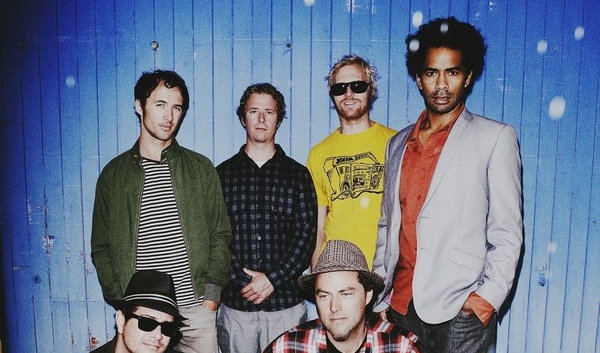The latter approach explains the 16-year perseverance of feel-good roots reggae exemplars, The Black Seeds. In 2012 the New Zealanders released their fifth LP, Dust and Dirt, which was followed by a sizable global touring campaign. Recently, however, The Black Seeds live shows have been few and far between. But there’s no cause for worry, as guitarist/vocalist Barnaby Weir informs us record number six is well under way.
“We’ve actually been working on an album for a couple of years now,” he says. “It was always going to be a less gigs and more studio, rehearsing and babies year this year.”
Hailing from Wellington, The Black Seeds formed in 1998. They’ve never been spotlight hogs, but in the years since 2001’s debut LP Keep on Pushing, they’ve accrued a loyal following. Each of The Black Seeds five albums has been met with doting applause, so it seems natural they’d reflect on their discography when contemplating new material. But Weir says there’s no inclination to repeat a winning formula.
“We don’t want to say, ‘Oh this one sounds like that song that we did.’ We’ve got our own sound and people will say, ‘Oh that sounds pretty similar to your first album.’ It’s like, ‘Well we are that same band.’ We’ve got a vibe and a certain approach.”
A key thing underpinning The Black Seeds’ decade-surpassing appeal is the band’s six savvy musicians not only dig a similar aesthetic, but they also share an understanding of where their strengths lie.
“We’re just happy with the kind of vibe that we are,” says Weir. “We all come from a similar direction, musically – or appreciate probably more your retro sounds, as opposed to club techno sounds.”
One thing you can be sure of is the beckoning lights of the latest trends will have no bearing on The Black Seeds next release. But, even if it’s unlikely the band’s sound will undergo any major refurbishment, Weir says they’re always open to new ideas.
“We do like to experiment with sounds and try to use new sounds. As long as we like what we’re doing then we’re quite happy. It’s about cutting through the crap and making it so it’s not a bore for anyone else and that it’s actually exciting.
“We’re certainly not going to worry about what’s fashionable,” he adds, “and think, ‘Oh we should really put some drum and bass bits in there,’ or, ‘We should put in some dub step.’ If you’re making stuff up to try to get on the radio or impress a certain scene, I think you’ve lost your grip.”
As well as enhancing their productivity, the band members’ shared vision has helped to keep the majority of the original lineup in place (a notable ex is Flight of the Conchords’Bret McKenzie, who left after three albums). While they’re all on the same page musically, each member’s life circumstances have altered significantly since the early days.
“Our lives are obviously a lot more complex, or depending on how you look at it, more simple,” says Weir. “We’re not flatting together anymore, we’re not all in the city any more, we’re not free to be a poor student type of person any more. Life’s changed and thank God it has.
“At the same time, you do need to manage that friendship, that brotherhood, that desire to still want to do it together. You’ve got to have goals; you have got to have a plan and try to keep communication open.”
Along with sticking to their guns artistically, through the years The Black Seeds have hung onto an independent ethos.
“I’ve taken on the production duties,” he says, “in terms of having a plan and putting it together and suggesting what’s going to be on the album. [I’m] being a bit of a musical director.
“Before we decided that, we’d done a lot of work together just jamming and just recording lots of ideas. There was heaps of work that had been done and we decided that I’d give it a good crack this time around. I love doing that stuff.”
Later this month The Black Seeds will take a break from the studio and jump across the Tasman for an Aussie tour. The group might be old hands at this by now, but they’re still dedicated to delivering the best shows possible.
“That’s always a big priority for me,” says Weir. “[We’re] making sure that when we do a gig anywhere, no matter how big or small, that it’s fucking awesome and not like a covers band of the band that you used to be in. Sometimes it can happen if you’re not in form or if you’re tired, but most of the time, we do it with feeling.
“I don’t want to brag,” he adds, “because that’s the worst. Jaded musicians are such a pain in the arse.”
BY AUGUSTUS WELBY

